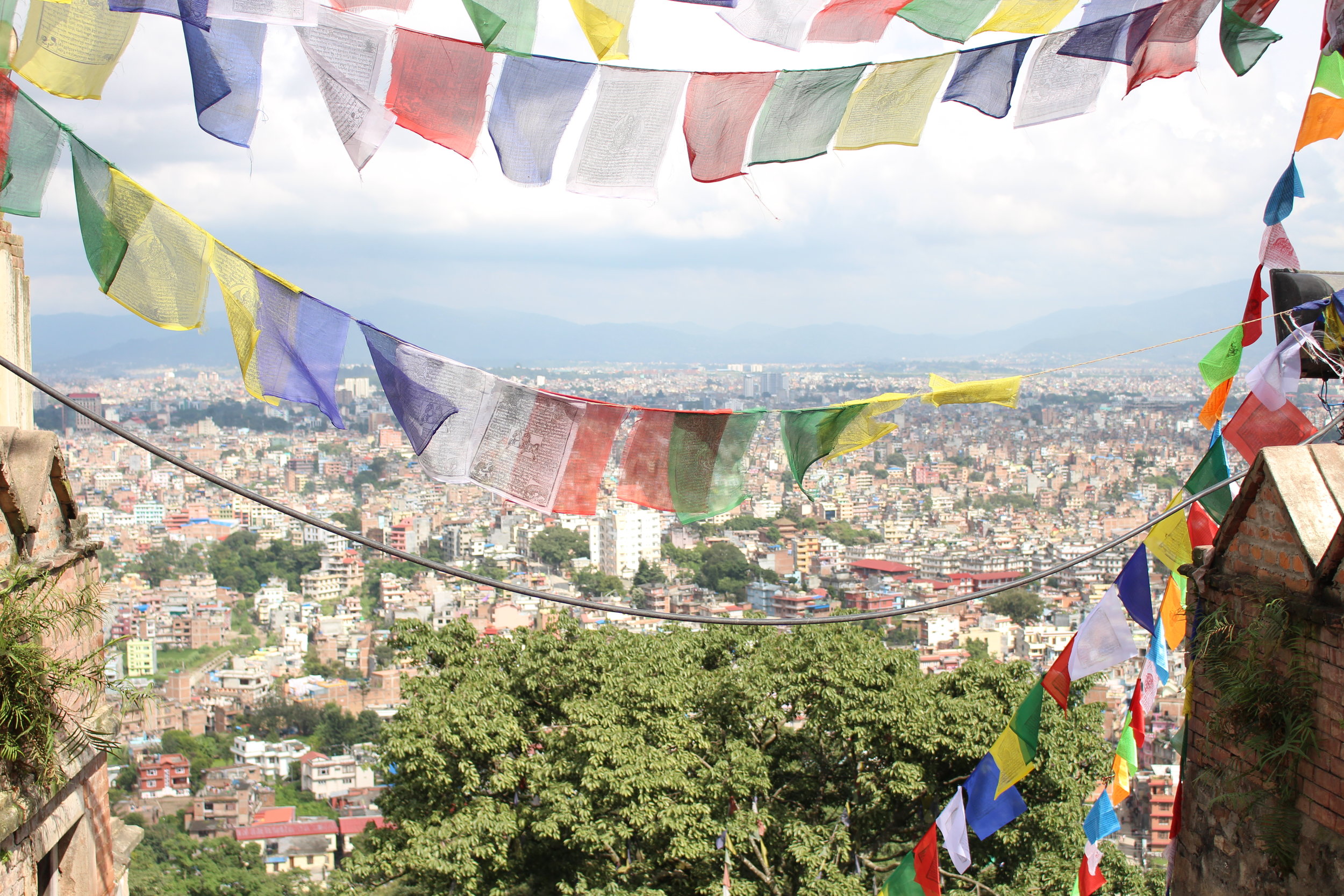Why Everest Base Camp Should be Top of Your 2019 Bucket List
Everyone has some kind of resolution or bucket list for 2019; whether you have specific goals like “get fit and run a marathon”, “grow my confidence”, or more general hopes for the year like “live my best life” and “spend more time with friends”.
For me, my 2019 is all about growing, being the best version of me and having a good time whilst doing it. This is so much easier said than done, so it’s got me thinking to times I have felt I have grown the most, achieved the unimaginable and come out a better me than before. The experience I come back to every time is of course, my trek to Everest Base Camp (EBC).
Before I left for Nepal, I was extremely anxious, lacked self confidence and was in a constant state of stress at work. It meant that I was avoiding time with friends, gaining weight and becoming a shell of the person I was before. Despite working for a travel company, even venturing over to Nepal with a group of people I’d never met before was a push outside my comfort zone. Little did I know, the push was exactly what I needed to reconnect with myself and realise my potential whilst having an amazing experience at the same time.
To me, the Everest Base Camp trek was a life-changing adventure. I reminisce about it often, and truly believe it can be the best thing a person will do in their life. So, why not do it now and make 2019 your year. Below you’ll find just 4 of the reasons I think the EBC trek is a must for anyone..
You can learn something new.
The working world often doesn’t present many opportunities for learning; despite the fact there’s so much research telling us it’s valuable. Learning helps to change our brain chemistry, it can prevent certain conditions and it can simply make us a more interesting person to be around. I love learning, and from the moment I stepped off the plane I was keen to learn everything I could about Nepalese culture, the mountains and the history of Everest. Lucky for me, this was easy to do as Choose a Challenge use locally-led challenges. My guide, Prahlad, was able to answer my endless questions with an amazing knowledge and passion for the place he was raised.
You’ll stay in places called tea houses along the way, local people work here and other trekkers will stay here too and share the social area. You have the opportunity to learn from so many different people; everyone has their own reasons for taking on the challenge, and their own stories to tell. You never know who you’ll meet and it can completely refresh your mindset.
Not only can you learn from other people; but there’s so much to learn along the route about Nepalese culture in itself. The route not only has amazing Tibetan history along the way, but you’ll also end up in Tengbonche on Day 4 of the trek, a beautiful active monastery. You can go in and meet the Monks who have been based there for weeks, months or even years. They have so much to talk about, and you come away feeling completely blown away by their kindness, compassion and dedication. The beautiful prayer flags scattered along the route, the magnificent stupas and the mantras written on rocks are all believed to blow with the wind and wish compassion on all travelling through the mountains. I love this, and still feel so grateful to this day for the kindness I felt in Nepal; their fantastic culture and their willingness to help me learn new things that I love to still research to this day.
It pushes you beyond your comfort zone.
A lot of us nowadays are settled in our daily routines: we wake up, go to work, see friends, exercise and sleep. Even our holidays aren’t really out of the ordinary: a nice little weekend break in Prague or a week in sunny Spain. Don’t get me wrong, I love my routine as much as the next person but it’s good sometimes to live beyond what you’re used to. Going beyond your usual limits will teach your more in 1 minute than you would learn in a few weeks sticking to your usual routine.
The 11-day trek sees you venture to over 5600 metres; going from the bustling Kathmandu up to Kala Patta to watch the sunrise over Everest. Trekking at altitude is a challenge; and it’s that challenging aspect that leads to the greatest reward when you finish. You hold that experience very close to your heart and wear it like a medal for life. You’ll soon realise early on in the trek that really the only thing stopping you from getting to the next camp is you. You learn to push through the “I’m not good enough, not fit enough, not enough” to get and Instead fill your head with “I did this yesterday, I can keep going today; I am strong and capable of anything”.
You’ll learn to take this and apply it to anything you want to achieve in your life; you don’t need anyone but yourself to get that promotion, health goal or new holiday. If you set your mind to it, you’ll figure out a way (even if it is a bit out of your comfort zone) and reach it. There’s really no better way to make a permanent change, than signing up to The Everest Base Camp Trek, and seeing for yourself what you are truly capable of.
Find out more about the itinerary and how to sign up on our Everest Base Camp Page.
You can take some time out to appreciate what you have.
That feeling you get when you’re on the tube and lose signal, or you go in to a pub and there’s no signal or wifi and you have that little break for a short moment. Imagine that for up to 12 days if you want it. It’s strange at first to not be able to scroll and have a little look into others lives, or to worry why someone hasn’t texted you back (cause you don’t know!). After just a day, I felt better. I was living in the moment, engaging more with the world and people around me and not fretting over minor things that once felt massive back home.
Being out in the mountains where their shear size is a reminder that we are a very small part of the world makes our problems even smaller; it really helps to put things into perspective. Not only that, but you learn to realise that just because you haven’t responded to that email, or answered that call - the world hasn’t fallen apart. It’s ok for you to be away for a while and take a break for you.
You start to appreciate the little things even more, like the taste of the gorgeous Dahl you’ve been served at lunchtime or the laughter shared with your team in a makeshift pub quiz one evening. It’s so wonderful to come back home, feeling less reliant on tech and more willing/able to switch off have some “me time” and appreciate the world around me that bit more.
You can build your community.
I genuinely struggled since leaving University to make good friends; most people seem set in their ways and less open to branching out their networks. Pushing myself into taking on a big old challenge with a bunch of strangers was the perfect way to break this. It helps in different ways; firstly with the confidence and skill to go out there and meet people. I was shy before, and wouldn’t start a conversation through fear of rejection or embarrassment. After a few hours of small talk with my new team; I was way more confident at starting conversations and maintaining chats which made it much easier to venture out when I returned home. The trek can also can give you plenty of stories to share, so you’ll never run out of things to say again. If anything, you’ll become the person that’s constantly saying “When I was watching the sunrise over Everest…”.
Spending over 11 days with a group also helps you to learn more about group dynamics; an exceptionally useful skill I’ve found if you’re gunning for a promotion and looking to manage people in the future. It’s a great experience and can help you personally and professionally. You can recognise better ways to help and support your friends, colleagues or even strangers.
Lastly, the opportunity to head away and meet a fantastic new bunch of people is the best thing hands-down about taking on a Challenge with Choose a Challenge. You can meet so many new friends, who love adventure, just like you. And there’s really no better way to bond with a group than to spend 11 days straight without phones, doing one of the toughest things you’ll ever achieve.
Want to sign up? It’s not too late to join our August Departure. Get your place here.
Overall, the Everest Base Camp Trek showed me I am capable of anything I set my mind to, rocketed my self confidence and my ability to speak to and bond with other people. I came back with a new appreciation for my situation at home: I had a warm flat, friends and a great job. i had day to day stresses, but instead of feeling overwhelmed by them daily, I was grateful for the challenge and learnings that came with them and knew I could handle anything thrown my way.
I had gone from a place of anger and frustration, to gratitude and compassion which allowed me to take control of things that weren’t so great in my life and change them for the better. I moved, I got a promotion and I had a whole bunch of new friends to keep in touch with who were just like me.
I’m not saying everyone will go through the transformation I did by taking on the challenge, but the people who stepped off the plane in Kathmandu, were not the same people who came back to London with me. We had all gone on our individual journeys together, and that’s the bond that’ll keep us connected for a lifetime. There’s really no reason why you shouldn’t go on your own life-changing journey in 2019; consider taking on the challenge this year yourself to finish your year accomplished, happy and excited for the life ahead of you.




